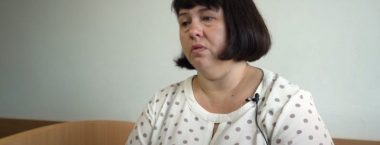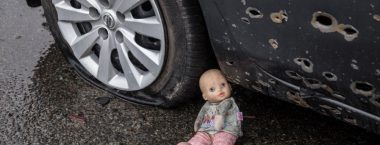
“People in their homes were dying from cold” – a nurse from Kharkiv
Interview by Taras Viychuk – I am 42 years old. I live and work in...
17 May 2022
19.12.2016
We continue a series of interviews “Women Human Rights Defenders, who сhange Ukraine”, dedicated to women-defenders working in various areas of human rights protection.
This year we celebrate the 40-th anniversary of the Ukrainian Helsinki Group, pioneers of Ukrainian human rights movement. UHHRU is its successor. We have developed an in-house policy of gender equality and non-discrimination and strive to make Ukrainian women human rights activist more visible in society.
Here is our fourth interview of the series for your attention. This time a Lviv lawyer Nina Khoma had answered our questions. The previous interviews are available for download.
Nina Khoma graduated from the Law Faculty of Lviv University of Business and Law and Lviv State University of Internal Affairs. She works with the NGO Centre for Legal and Political Research “SIM” (the organization which is a member and co-founder of the Ukrainian Helsinki Human Rights Union).
Since March 3, 2015, she has been coordinating the Cinema Club on human rights media education Docudays UA at the National Museum-memorial “Prison at Lontskoho Street” in Lviv and taking care of other such film societies in the city. She has publications on Belarus as “the last European country which has not abolished the death penalty”, “Cooperation of the civil and law enforcement agencies: from counterbalance to interaction” and more. She has got an acknowledgement from the Minister of Education and Science of Ukraine for outstanding achievements in social work. She has successfully run two strategic litigations supported by the Strategic Litigations Center of UHHRU on the protection of large families (recovery of the status of families with many children, having children from different marriages; recovery of all the benefits and amending legislation) and refund to cheated depositors by the Oschadbank (appropriated by bank employees).
– Please share the history of his involvement in the human rights movement in Ukraine. Why did you decide to work in this field?
– I was a child with a heightened sense of justice. I always felt a shame to see or to hear when a “stronger” person mocked or laughed over a “weaker” one. I resented, when someone insulted me, especially close people. Although I have not dreamed about jurisprudence since childhood, human rights protection is my conscious choice. While being a 2nd-year student at the university, I started to engage in social activities (as my teacher – Ruslan Topolevskyi recommended me and I am thankful to him for this).
Later, back in 2008, I had met with Lydiia Topolevska (Director of the NGO Center for Legal and Political Research “SIM”). I have been co-operating with her up to this day.
– Where have you obtained education and knowledge in the field of human rights?
– The most significant for me was the School on human rights for youth of the Ukraine-wide educational program “We Understand Human Rights” and the School on human rights of the Kharkiv Human Rights Protection Group. There I gained fundamental knowledge in this area, met many very interesting people and made friends. By this time we hold joint actions and implement projects.
– What is your subject in the field of the human rights?
– The history of the origin of human rights, its standards and principles; the right of ownership; the right to life. I organise educational and rising awareness events, providing primary legal aid, deal with strategic litigations.
– Have you worked with the theme of women’s rights?
– During the Travelling International Documentary Film Festival on Human Rights Docudays UA in Lviv Oblast, there were films on this theme. We invited interesting guests, human rights activist and discussed their activities and the rights of women in particular. This year, on November 11, the Festival was opened with this topic – “Women Human Rights Activists as Guides from the World of Illusion.” These events were interesting; many people attended them; discussions were informative.
– In your opinion, what are the greatest successes of the human rights movement in Ukraine?
– Lobbying adoption and application of the concept of human rights in education (although this process is a bit slow, but still slowly moving forward); inviting prominent human rights defenders and human rights activist in the selection, certification and training people to key positions in the field of observance and protection of human rights (police, legal aid office managers, anti-corruption bureau, and other).
– What challenges do the modern human rights movement face in Ukraine?
– Many judges, prosecutors, and lawyers, state executors (but not all!) see human rights defenders as competitors or non-professionals. They often ignore our work, achievements, recommendations simply because of their ambitions and stereotypes. There are also those officials who just want to enjoy our efforts for reporting. On the one hand, we are pleased by their trust but would like to achieve active cooperation and complementarity, so to speak.
But the biggest challenge for me is now a catastrophic problem with execution of judgments, particularly regarding the most vulnerable groups of people. It is painful to realize that many pre-trial and legal efforts, successful strategic results in a judgment simply broke because of the “wall of cynicalness” of the entire system of executive services and pension fund. However, the struggle continues, we do not give up!
– In your opinion, is there enough attention paid to gender issues by the human rights movement?
– Good is never too much. I believe that we all must still pay more attention to this issue and learn to be gender sensitive, especially at home, because this is a start for everything. In my view, kindergarten education should be gender oriented, or even earlier. It is important to pay attention to this subject in the field of journalism and television, because of (but not only) media, mass culture is emerging.
Many judges, prosecutors, and lawyers, state executors (but not all!) see human rights defenders as competitors or non-professionals.
– Gender-based violence is a serious problem, particularly in Ukraine. In your opinion, what should be done to improve the situation?
– I think this is, firstly, the lack of gender culture at school, and, secondly, the lack of individual responsibility of investigators, who often do not want to deal with “family quarrels.” It also lacks a system of crisis centers that would provide qualified social and psychological assistance, rehabilitation and shelter for victims of domestic violence.
Very few agencies deal with the issue of domestic violence among combatants. These are mostly the efforts of civic and charitable organizations. Where are government programs? Where is funding?
– What or who inspires you the most in your human rights work?
For me, a respected human rights activist is Marek Nowicki. This is a man who knew how to simply and openly talk about difficult and the most important, to communicate values to any audience. I often use his materials and videos in the practice. It is a pity that this man is no longer with us. However, his teachings and statements will long serve as a guide to many of life!
Interviewed by Tamara Martseniuk
If you find an error on our site, please select the incorrect text and press ctrl-enter.

Interview by Taras Viychuk – I am 42 years old. I live and work in...
17 May 2022

The Kharkiv Human Rights Group (KHRG) is documenting international crimes (genocide, crimes against humanity, war...
14 April 2022

The Global initiative “Tribunal for Putin” invites to a closed online event “Kyiv region under...
12 April 2022

The Global initiative “Tribunal for Putin” invites to a closed online event “Kyiv region under...
12 April 2022